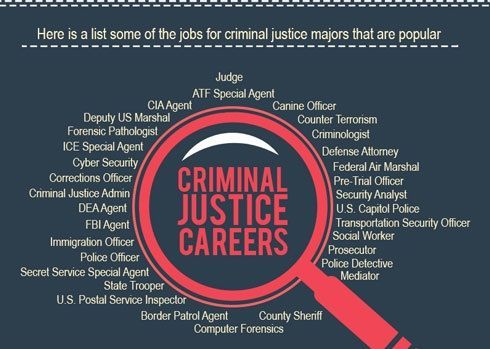Lots of people choose to study for a criminal justice bachelor’s or master’s degree at college. For some careers, it’s essential, and for others it is desirable. Let’s take a look at a few of those career options.
Law Enforcement
One of the most common career paths for someone with an online criminal justice degree is a job in law enforcement. Many police departments require a bachelor’s degree in criminal justice or a related field. With this degree, you can pursue careers as a police officer, sheriff’s deputy, FBI agent, U.S. Marshal, highway patrol officer, parole officer, and more.
Law enforcement careers often start with completing a police academy training program. This prepares you for the physical and academic rigors of the job. As a police officer or deputy, you will be responsible for enforcing laws, responding to emergency calls, writing reports, collecting evidence, and testifying in court. There is also room for advancement into leadership and investigative roles.
Corrections
The corrections system offers many career opportunities for those with a criminal justice degree. You could work as a correctional officer in a prison, jail or juvenile detention center. This involves maintaining security and safety by supervising inmates and enforcing rules. With experience, correctional officers can advance to roles as corporals, sergeants, captains, and wardens.
A criminal justice degree is also required for probation officer and parole officer jobs. In these roles, you monitor offenders who have been released from jail/prison to ensure they follow the terms of their probation/parole. You would make recommendations regarding sentencing, release terms, and rehabilitation of offenders.
Forensics
Forensic science is an exciting field that applies science and investigative techniques to help solve crimes. There are several possible careers here for those with a criminal justice degree. As a crime scene investigator, you would photograph, diagram, and collect physical evidence from crime scenes. Forensic science technicians then analyze this evidence in laboratories.
Other forensic careers include fingerprint analysts, ballistics experts, DNA analysts, forensic psychologists, and coroners. These jobs require very careful attention to detail and a scientific mindset. You may need additional coursework in biology, chemistry, and laboratory science.
Legal System
A criminal justice degree provides a solid foundation for a career in the legal system. Many lawyers begin as criminal prosecutors or public defenders. You could also work in a support role as a paralegal for a law firm. Your knowledge of the criminal justice system is useful in conducting legal research, preparing documents, and assisting lawyers during trials.
Other options include court clerk jobs that maintain court records, assist judges, accept filings, and administer oaths. A criminal justice degree and interest in law can lead to careers as alternative dispute resolution specialists and legal mediators.
Federal Agencies
Several federal government agencies related to law enforcement and national security offer criminal justice career paths. These include the FBI, CIA, DEA, ATF, Secret Service, Border Patrol, TSA, and Immigration and Customs Enforcement (ICE). Jobs range from special agents and investigators to security coordinators and intelligence analysts. U.S. Marshals and U.S. Capitol Police also utilize criminal justice degrees. Applicants often need a clean background, physical fitness, foreign language skills, or technology expertise depending on the role.
The wide range of criminal justice careers shows the flexibility and value of this degree. With a mix of continued education, training, and field experience, there are many ways to launch an exciting and meaningful career.





Be First to Comment